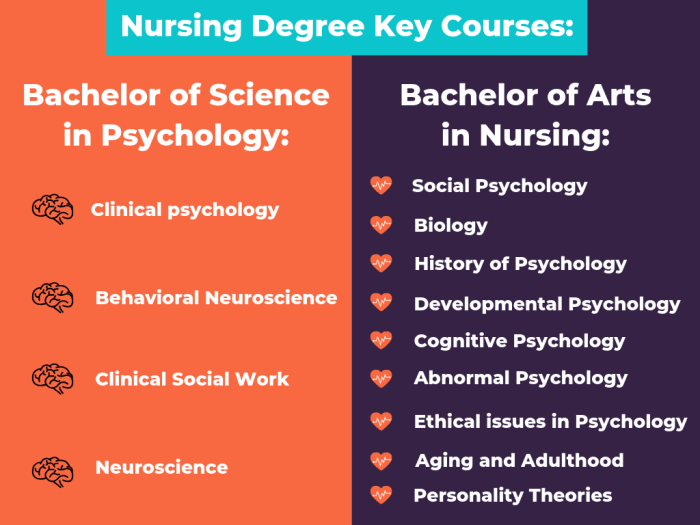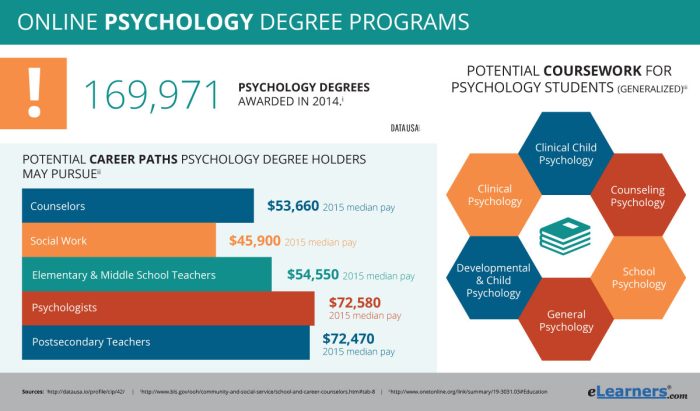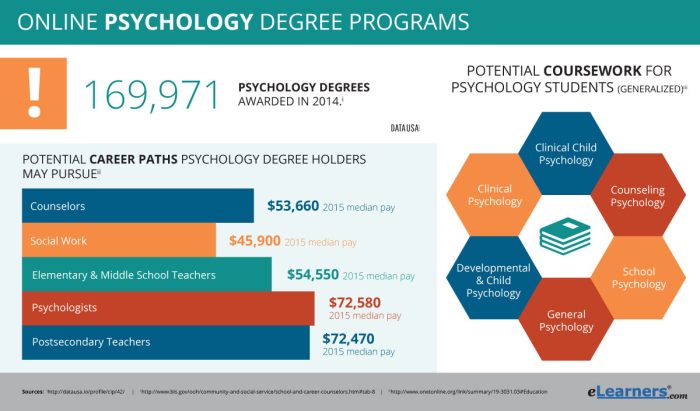Best online schools for bachelor’s degree in psychology – Best online schools for a bachelor’s degree in psychology offer a flexible and convenient path to a rewarding career in the field. With the increasing demand for mental health professionals, online programs provide accessibility and affordability, making it easier for individuals to pursue their passions.
Choosing the right online program requires careful consideration of factors such as program quality, accreditation, faculty expertise, and student support services. This guide will delve into these crucial aspects, providing insights into the top online schools for a bachelor’s in psychology.
Introduction: Best Online Schools For Bachelor’s Degree In Psychology
The field of psychology is experiencing a surge in demand for qualified professionals, and online education has emerged as a convenient and flexible pathway to a bachelor’s degree in this growing field. Online psychology programs offer a wealth of benefits, allowing individuals to pursue their educational goals while balancing personal and professional commitments.
Earning a bachelor’s degree in psychology online can provide individuals with a solid foundation in the principles and theories of human behavior, cognitive processes, and social interactions. This knowledge equips graduates with valuable skills applicable to a wide range of careers, including mental health counseling, research, human resources, and education.
Looking to delve deeper into the human mind and behavior? Consider pursuing psychology programs online accredited. These programs offer a comprehensive understanding of psychological principles, research methods, and therapeutic approaches, all while providing the flexibility of online learning.
Factors to Consider When Choosing an Online Psychology Program, Best online schools for bachelor’s degree in psychology
When selecting an online psychology program, several key factors should be carefully considered to ensure the program aligns with your individual needs and aspirations.
Choosing the right online psychology program requires careful consideration of various factors to ensure a fulfilling and rewarding educational experience.
- Accreditation: Accreditation ensures that the program meets specific quality standards and prepares graduates for professional licensure or certification. Look for programs accredited by reputable organizations such as the American Psychological Association (APA) or the Council for Higher Education Accreditation (CHEA).
- Curriculum: Evaluate the program’s curriculum to ensure it aligns with your career goals. Consider the core courses offered, such as research methods, statistics, developmental psychology, and abnormal psychology.
- Faculty: Explore the qualifications and experience of the program’s faculty. Look for professors with strong academic credentials and practical experience in the field of psychology.
- Technology and Support: Assess the program’s technology infrastructure and support services. Look for programs that offer user-friendly learning platforms, reliable technical support, and dedicated academic advisors.
- Flexibility and Cost: Consider the program’s flexibility in terms of scheduling and course delivery. Look for programs that offer a variety of course formats, such as asynchronous online learning, live webinars, and blended learning options. Additionally, compare tuition fees and financial aid options to find a program that fits your budget.
Top Online Schools for a Bachelor’s Degree in Psychology

Earning a bachelor’s degree in psychology online can be a rewarding and flexible way to pursue your academic goals. With numerous online programs available, it’s essential to research and choose a program that aligns with your career aspirations and learning style.
If you’re passionate about helping others and want to make a difference in the world, an online master social work degree could be the perfect path for you. This program equips you with the knowledge and skills to address complex social issues, providing a flexible and accessible way to advance your career in social work.
This article explores top online schools offering bachelor’s degrees in psychology, highlighting program features, accreditation, and factors to consider when making your decision.
Top Online Schools for a Bachelor’s Degree in Psychology
The following table showcases top online schools for a bachelor’s degree in psychology, based on program quality, affordability, and student satisfaction.
| Rank | School Name | Program Highlights | Accreditation |
|---|---|---|---|
| 1 | Arizona State University |
|
Regionally accredited by the Higher Learning Commission (HLC) |
| 2 | University of Florida |
|
Regionally accredited by the Southern Association of Colleges and Schools Commission on Colleges (SACSCOC) |
| 3 | Purdue University Global |
|
Nationally accredited by the Distance Education Accrediting Commission (DEAC) |
| 4 | Capella University |
|
Nationally accredited by the Higher Learning Commission (HLC) |
Program Curriculum and Coursework

An online psychology bachelor’s degree program provides a comprehensive foundation in the field, covering various aspects of human behavior and mental processes. The curriculum typically encompasses a blend of core courses and elective options, allowing students to tailor their studies to their interests and career goals.
Core Courses
Core courses form the foundation of a psychology degree and provide a broad understanding of the field. These courses cover fundamental concepts, theories, and research methods used in psychology. Common core courses include:
- Introduction to Psychology: This introductory course provides an overview of the field of psychology, exploring its history, major perspectives, and subfields. Students learn about key concepts such as sensation, perception, learning, memory, motivation, emotion, and personality.
- Developmental Psychology: This course examines human development across the lifespan, from infancy to adulthood. It explores various theories of development, including cognitive, social, emotional, and physical changes that occur at different stages of life.
- Research Methods: This course teaches students the principles and techniques of scientific research in psychology. Students learn about research designs, data collection methods, statistical analysis, and ethical considerations in research.
- Statistics: This course focuses on the statistical methods used in psychological research. Students learn about descriptive statistics, inferential statistics, and data analysis techniques to interpret and analyze research findings.
- Abnormal Psychology: This course explores the nature and causes of mental disorders. Students learn about different types of psychological disorders, their symptoms, diagnostic criteria, and treatment approaches.
- Social Psychology: This course examines how individuals’ thoughts, feelings, and behaviors are influenced by social contexts. It explores topics such as social perception, attitudes, group dynamics, and social influence.
Elective Options
Elective courses allow students to delve deeper into specific areas of psychology that align with their career aspirations or personal interests. Some common elective options include:
- Clinical Psychology: This specialization focuses on the assessment, diagnosis, and treatment of mental disorders. Students learn about various therapeutic approaches, such as psychotherapy, cognitive-behavioral therapy, and psychodynamic therapy.
- Social Psychology: This specialization explores the social influences on behavior, attitudes, and cognition. Students delve into topics such as social perception, prejudice, aggression, and prosocial behavior.
- Industrial-Organizational Psychology: This specialization applies psychological principles to workplace settings. Students learn about topics such as employee motivation, job satisfaction, leadership, and organizational behavior.
- Cognitive Psychology: This specialization focuses on the study of mental processes, including memory, attention, perception, and language. Students explore cognitive theories and models, and examine how these processes influence behavior.
- Forensic Psychology: This specialization applies psychological principles to legal settings. Students learn about topics such as criminal profiling, eyewitness testimony, and jury decision-making.
Accreditation and Licensing
Accreditation is crucial for online psychology programs because it ensures that the program meets certain quality standards. It is a process by which an external body evaluates a program’s curriculum, faculty, resources, and student outcomes. Accreditation provides assurance to students and employers that the program is reputable and prepares graduates for success in the field.
Types of Accreditation
Accreditation for psychology programs can come from various organizations, each with its own set of standards.
- Regional accreditationis granted by agencies that evaluate institutions as a whole. Examples include the Middle States Commission on Higher Education (MSCHE) and the Southern Association of Colleges and Schools Commission on Colleges (SACSCOC). Regional accreditation is typically considered the most prestigious form of accreditation, as it signifies a commitment to overall academic quality.
- National accreditationis granted by agencies that focus on specific disciplines or professions. For psychology programs, the most common national accrediting body is the American Psychological Association (APA). APA accreditation signifies that a program meets the highest standards for training in psychology.
- Specialized accreditationis granted by agencies that focus on specific types of psychology programs. For example, the Council on Accreditation of Counseling and Related Educational Programs (CACREP) accredits counseling programs.
Accreditation can affect a student’s eligibility for financial aid, transfer of credits, and professional licensure. It also helps to ensure that the program provides a rigorous and comprehensive education in psychology.
Licensing Requirements for Psychologists
Psychologists must be licensed to practice in the state where they work. Licensing requirements vary by state, but generally involve completing an accredited doctoral program in psychology, passing a national examination, and completing a supervised internship or residency.
Online psychology programs can prepare students for licensure by offering courses that cover the core knowledge and skills required for licensure, such as:
- Research methods
- Statistics
- Ethical principles of psychology
- Assessment and diagnosis
- Treatment planning and intervention
Online programs can also provide students with opportunities to gain practical experience through internships or practicums.
It is important to note that online programs cannot guarantee licensure. Students must meet all of the requirements set by their state’s licensing board.
Final Review
Earning an online bachelor’s degree in psychology can open doors to a wide range of fulfilling career opportunities. By carefully evaluating your options, selecting a reputable program, and dedicating yourself to your studies, you can embark on a journey that combines academic excellence with personal growth and professional advancement.
